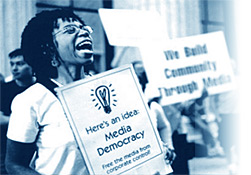Baltimore IMC : http://www.baltimoreimc.org
LOCAL Announcement :: Activism : Elections & Legislation : Media
Media Access Rip-off Vote in Congress Soon
The US House of Representatives votes on the corporate media's "COPE Act" Thursday May 4th. It will shift Internet and Cable media access power to the corporations, weakening our voices in the future.
.
[Editor's Note: The US House of Representatives was originally scheduled to vote on the COPE Act on May 4, 2006. The vote has been delayed.]
If you think it's hard to fight corporate power now, imagine doing it with reduced access to the Internet and the emerging Cable/Phone Public Access TV medium.
Contact your Representative (and friends) with this simple message:
"Vote No on the Barton/COPE Act
+ It undermines Public Access to the monopoly-owned Cable/Phone TV medium.
+ It undermines Public Access to the Internet. We want Network Neutrality."
www.house.gov/writerep

Slowly our Media Access has Eroded
During the Regan era they took away the"Fairness Doctrine", which required corporate media to provide access for opposing views as a requirement of their broadcast license.
The 1996 Telecommunications Act led to media consolidation, like the majority of AM Radio stations being owned by Right-wing corporations. Clear Channel used their AM Radio megaphone to rally the public into the Iraq War.
Now the Plutocracy is about to Corner the Emerging Internet and Cable/Phone Media.
Network Neutrality: If the COPE Act passes, internet network owners will be able to determine whose data flows fast or slow across "their" network. Data will move fast for those with money, and slow for the rest of us.
Public Access TV: Still in its infancy, Public Access TV, via cable & phone lines, has awsome potential as a social organizing/educating medium. Because video-editing technology is now accessible to average people, the potential for community broadcasting is just emerging. The COPE Act will squash this by tilting power to the corporations. It would remove the rights of cities to negotiate franchise agreements with monopoly cable and phone companies.
"This overhaul of telecommunications law could be more devestating to community interests than the Telecommunications Act of 1996," Mike Shea, local media activist.
For More Information:
Save Access
www.saveaccess.org
Manhattan Neighborhood Network
www.mnn.org
[Editor's Note: The US House of Representatives was originally scheduled to vote on the COPE Act on May 4, 2006. The vote has been delayed.]
If you think it's hard to fight corporate power now, imagine doing it with reduced access to the Internet and the emerging Cable/Phone Public Access TV medium.
Contact your Representative (and friends) with this simple message:
"Vote No on the Barton/COPE Act
+ It undermines Public Access to the monopoly-owned Cable/Phone TV medium.
+ It undermines Public Access to the Internet. We want Network Neutrality."
www.house.gov/writerep

Image from the "Save Access" Web Site
Slowly our Media Access has Eroded
During the Regan era they took away the"Fairness Doctrine", which required corporate media to provide access for opposing views as a requirement of their broadcast license.
The 1996 Telecommunications Act led to media consolidation, like the majority of AM Radio stations being owned by Right-wing corporations. Clear Channel used their AM Radio megaphone to rally the public into the Iraq War.
Now the Plutocracy is about to Corner the Emerging Internet and Cable/Phone Media.
Network Neutrality: If the COPE Act passes, internet network owners will be able to determine whose data flows fast or slow across "their" network. Data will move fast for those with money, and slow for the rest of us.
Public Access TV: Still in its infancy, Public Access TV, via cable & phone lines, has awsome potential as a social organizing/educating medium. Because video-editing technology is now accessible to average people, the potential for community broadcasting is just emerging. The COPE Act will squash this by tilting power to the corporations. It would remove the rights of cities to negotiate franchise agreements with monopoly cable and phone companies.
"This overhaul of telecommunications law could be more devestating to community interests than the Telecommunications Act of 1996," Mike Shea, local media activist.
For More Information:
Save Access
www.saveaccess.org
Manhattan Neighborhood Network
www.mnn.org
Views
Information
Search
This site made manifest by dadaIMC software

